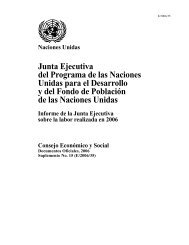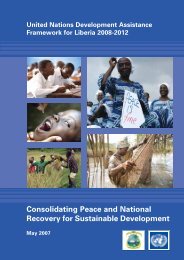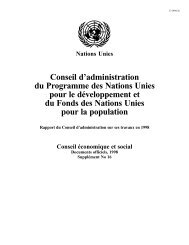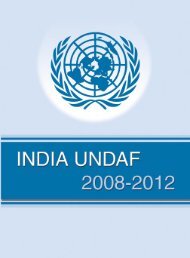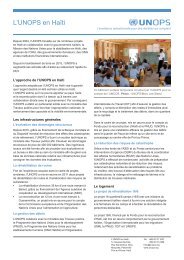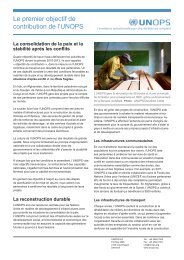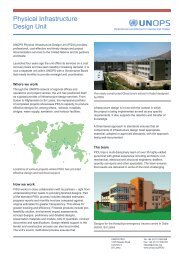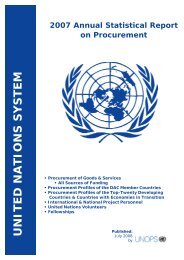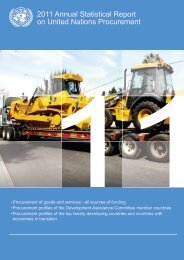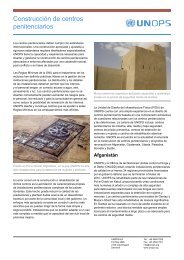English - UNOPS
English - UNOPS
English - UNOPS
You also want an ePaper? Increase the reach of your titles
YUMPU automatically turns print PDFs into web optimized ePapers that Google loves.
E/2004/35<br />
pledges. She appreciated donor support for the Fund’s work in promoting a rightsbased<br />
and culturally sensitive approach to programming. She assured delegations<br />
that the MYFF would not introduce conditionalities. She highlighted the Fund’s<br />
partnerships with WHO, the World Bank and UNAIDS, among others. She updated<br />
the Executive Board on the regional reviews under way on the occasion of the tenth<br />
anniversary of ICPD. Regarding LDCs, she stated that priority to LDCs was<br />
mainstreamed in the work of UNFPA and in its resource allocation system. She<br />
noted that 67 per cent of the Fund’s resources went to “category A” countries, which<br />
included all the LDCs. She appreciated the offer regarding South-South cooperation.<br />
She underscored the centrality of reproductive health commodity security to<br />
UNFPA-supported programming.<br />
113. Concerning the comment on the term “reproductive health services”, the<br />
Executive Director stated that the Fund’s mandate and reproductive health<br />
terminology were derived from the ICPD Programme of Action. She cited paragraph<br />
8.25 of the Programme of Action which, inter alia, states that “in no case should<br />
abortion be promoted as a method of family planning”. Regarding the “A, B, C”<br />
approach to HIV/AIDS prevention, she confirmed that in keeping with the<br />
international consensus UNFPA promoted all three components.<br />
114. The Chief of the Strategic Planning Office appreciated the comments made by<br />
delegations and thanked them for the guidance they had provided throughout the<br />
MYFF development process. She agreed that there was a need to improve data at all<br />
levels, as well as to strengthen monitoring and evaluation and to have adequate<br />
baselines for qualitative and quantitative indicators to measure progress in attaining<br />
results. She assured the Executive Board that UNFPA would continue to invest in<br />
capacity-building and results-based management. She stated that the MYFF was<br />
strong on gender issues and noted that the Fund maintained close coordination with<br />
UNIFEM. She took note of the request to report in more detail on the Fund’s<br />
partnership strategy. She underscored that the Fund believed in strong families,<br />
including attention to gender equity, healthy adolescent development, and women’s<br />
and girls’ empowerment.<br />
115. The Executive Board adopted decision 2004/7 on the UNFPA multi-year<br />
funding framework, 2004-2007.<br />
116. Following the Executive Board’s adoption of the decision on the MYFF, the<br />
delegation of the United States of America noted its concerns about certain aspects<br />
of the ICPD Programme of Action and ICPD+5. While joining the consensus on the<br />
decision, the delegation stated that its concerns remained relevant to the decision.<br />
XII.<br />
Other matters<br />
Review of the WHO/UNICEF/UNFPA Coordinating Committee on Health<br />
117. The Chief of the Reproductive Health Branch, UNFPA, introduced the report<br />
entitled Review of the WHO/UNICEF/UNFPA Coordinating Committee on Health<br />
(DP/FPA/2004/CRP.1).<br />
118. The Executive Board endorsed the recommendation contained in the report to<br />
discontinue the WHO/UNICEF/UNFPA Coordinating Committee on Health. The<br />
19




